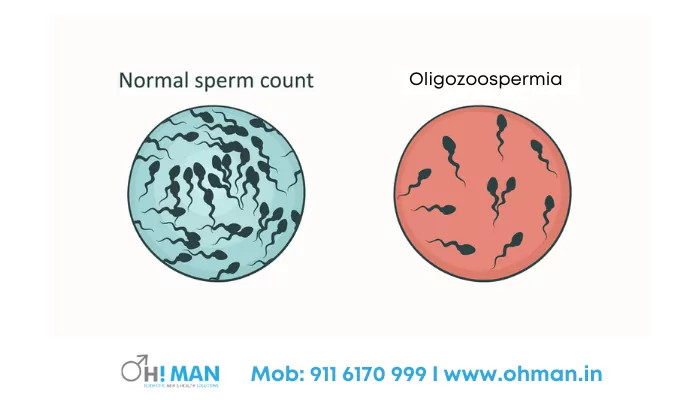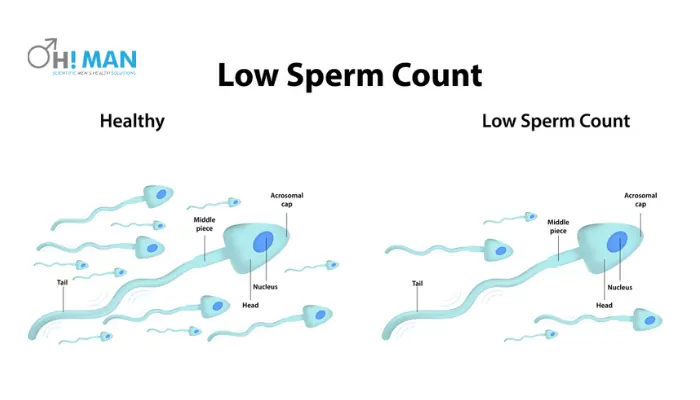Oligozoospermia(Low Sperm Count): Causes & Treatment
Oligozoospermia(Low Sperm Count): Causes & Treatment

You might not realize you are experiencing low sperm count (also known as Oligozoospermia or oligospermia) while trying to conceive a baby and failing. It is more difficult to conceive naturally, although successful pregnancies can still occur. Further tests may reveal that you have less sperm than the average man. Sperm problems are common, including low sperm count and sperm quality problems. However, several causes of low sperm count have treatment options.
According to the WHO, oligospermia treatment is necessary when the total sperm count is less than 15 million sperm per millilitre of ejaculate.
How many men experience low sperm counts in their sperm is unknown, partly because not everyone with the condition gets diagnosed. Further, only males with trouble conceiving normally and who want treatment undergo diagnosis. A low sperm count doesn’t eliminate the chances of natural conception but reduces your likelihood.
Types Of Oligozoospermia
There exist three types of oligozoospermia. Based on the low sperm count level, the doctor will diagnose the male with one of the types.
- Mild oligospermia: When the spermatozoa amount discovered in a specimen of sperm varies from 15 to 10 million per milliliter.
- Moderate oligospermia: There are between 5 and 10 million sperm per milliliter in the sample. In such cases, significant changes may be seen following adequate therapy and healthier life for the next few months. After this period, the doctor will perform the semen analysis again.
- Severe oligospermia: If the sperm count ranges between 0 and 5 million sperm/mL, you have severe oligospermia.
Symptoms of Oligozoospernia
The main sign of low sperm count is the inability to conceive a child. There may be no other obvious signs or symptoms. In some men, an underlying problem such as a hereditary chromosomal abnormality, a hormonal imbalance, dilated testicular veins, or a condition that blocks the passage of sperm can cause signs and symptoms.
Symptoms of low sperm count may include:
- Problems with sexual function – for example, low sex drive or difficulty maintaining an erection (erectile dysfunction)
- Pain, swelling, or lump in the testicle area
- Loss of facial or body hair or other signs of a chromosomal or hormone abnormality
What Causes Low Sperm Count?
It’s usual for your sperm concentration to vary over time, particularly as you become older. However, some medical problems and lifestyle choices might raise a person’s risk of oligozoospermia.
1. Varicocele
Varicocele, or enlarged veins in the scrotum, may cause oxidative stress, impede adequate blood supply to the testes, or limit testosterone levels, all of which can reduce sperm count. Further, Varicocele is a relatively frequent condition that develops throughout adolescence and frequently goes undiagnosed because of its mild symptoms.
2. Exposure to heat
Heat exposure may promote oxidative stress, which has a link to sperm destruction. Sitting for lengthy amounts of time every day, putting computers or other high-temperature gadgets near your genital harms your sperm. Further, it affects sperm motility, sperm count, and viability. Even utilizing saunas or hot baths or wearing tight clothes affects sperm count and it can also lead you to asthenozoospermia.
3. Toxic and radioactive exposure
Radiation, as well as insecticides, lead, metal, and petrochemicals, may harm sperm count. Further, males working in an environment regularly getting exposed to such chemicals have lower sperm quality and count.

4. STIs
STIs may lead to fertility problems like oligospermia. Although if you don’t have any indications, an ongoing bacterial infection or virus might have a harmful influence on your reproductive tract. Even while HPV – the most prevalent STI — does not have symptoms in several men, research suggests that it affects sperm production. So men must regularly test themselves for STIs and, if diagnosed, get treatment immediately.
5. Hormone imbalances
Several hormones are responsible for male fertility. So these include luteinizing hormone, follicle stimulating hormone, and testosterone. These hormones and a few others play an essential role in spermatogenesis. However, if some of these hormones are out of balance, your sperm concentration may suffer, causing problems like oligozoospermia and hypogonadism.
6. Ejaculation issues
Ejaculation issues are another issue that causes low sperm count in men. Retrograde ejaculation is one of such ejaculation issues that create sperm count problems. It usually happens due to injuries, bladder or prostate cancer surgeries, and infections like prostatitis and gonorrhea.
7. Drug usage
Anabolic steroid drugs used to increase muscular strength and growth might cause testicles to shrink, reducing sperm production.
8. Smoking
smoking is also harmful to your sperm. Men smoking have lower sperm counts than men who do not smoke.
9. Weight issues
Being overweight or obese may raise your chances of low sperm counts in various ways. Excessive body fat and low muscle mass maintain testosterone levels below normal, resulting in poor sperm quality.
10. Stress
One of the most prevalent causes of oligozoospermia is stress, which affects sperm production by causing hormonal imbalance and hypogonadism.
11. Genetic Defect
genetic defects such as Klinefelter syndrome and undecadent testicles are one of the major causes of low sperm count in men. These factors directly affect the sperm production and cause male infertility issues.
12. Structural Problem
For example, the tubes that carry sperm are damaged and blocked by disease or injury, or absent from birth
13. Testicular causes
When oligospermia arises from a testicular cause, it refers to changes in the testicles. Among the most frequent testicular changes are the following:
Hydrocele
A hydrocele is usually not dangerous and does not usually affect fertility. But a hydrocele can be associated with an underlying testicular condition that can lead to serious complications, including Infection or tumor. Either might reduce sperm production or function.
Effects Of Oligozoospermia On Fertility
A few men with oligospermia still can conceive despite possessing lower sperm counts. However, fertilization may be more challenging and require more effort than for couples without reproductive problems. Further, several men with oligozoospermia may be able to conceive without difficulty, despite low sperm count.
The most prevalent causes of oligospermia also enhance a man’s likelihood of experiencing other reproductive concerns, and this involves issues with sperm motility.
Sperm motility describes the “activity” of sperm. Other normal behavior enables sperm to move toward an egg for fertilization without difficulty. Further, sperm with impaired motility may be incapable of reaching an egg. Additionally, sperm may travel unanticipatedly, preventing it from contacting an egg.
Oligozoospermia/Low Sperm Count Treatment
1. Surgery
If Varicocele causes oligospermia, the condition will need surgery to address it. During the operation, the physician will constrict the swollen vein and redirect blood circulation to another vein.
2. Medication
The underlying causes for oligospermia include hormone imbalance, infection, inflammation, etc. The therapy will consist of medications, and the medication stops future sperm count decline; nevertheless, additional treatment is necessary.
3. Hormone Therapies
Several hormonal medicines and injections may restore the hormones and increase sperm count.
4. Lifestyle changes
Weight loss and maintenance of healthy body weight may increase sperm count. Further, It may also lower your risk for various other illnesses. Avoid using alcohol, drugs, and smoke to increase sperm counts.

5. Assistant Reproduction Techniques (ART)
While struggling with Oligozoospermia, Assisted Reproduction Techniques like IVF or IUI may assist you in approaching parenthood. However, you must first find a reputable reproductive clinic and then consult with a fertility specialist to discuss your alternatives.
If you are attempting to become a father but conception does not occur spontaneously, you and your spouse should consult with a fertility specialist and undergo fertility testing. If you have been diagnosed with oligospermia, you should see a reproductive specialist as soon as possible.
Natural Treatment for Oligozoospermia
Some of the natural methods to treat low sperm count include:
- Get sufficient exercise and rest.
- Stop smoking
- Prevent excessive use of alcohol and drugs
- Avoid using certain prescription drugs.
- Receive adequate vitamin D
- Take ashwagandha (moderate or prescribed amounts)
- Take Ginseng (moderate or prescribed amounts)
- Eat more meals high in antioxidants to increase sperm count.
- You can also take PDE – 5 Inhibitors.
Bottom Line
The symptoms of low sperm count may be discovered while you and your spouse attempt to conceive. You must see your healthcare professional if you engage in unprotected intercourse for a year or more. Further, A low sperm count may indicate various conditions, but it does not exclude parenthood. Ask your physician about procedures or procedures that may increase your chances of becoming pregnant. You can also consult Ohman about your condition & get online dhat ki dawa to control the Oligozoospermia & proceed for further treatment.
Frequently Asked Questions
1. Is oligozoospermia genetic?
In other circumstances, oligozoospermia may be a hereditary condition. Oligozoospermia may be caused by genetic abnormalities such as Klinefelter syndrome and Y chromosome microdeletions, and these conditions are often inherited from the man’s father.
2. Which drugs cause oligospermia?
Beta-blockers, blood pressure drugs, and antibiotics may cause issues with ejaculation and a decrease in sperm count.
3. Which food improves sperm?
Several foods boost sperm quality. So these may include dark chocolate, oysters, zinc-rich food, walnuts, etc.
4. What causes severe oligozoospermia?
A male with severe oligozoospermia has an abnormally low sperm count. Further, this may be due to various circumstances, including genetic abnormalities, infections, and exposure to specific chemicals and drugs.
5. Can oligospermia be corrected?
Oligospermia can be easily corrected or reversed through surgery, proper medications, and hormone treatment. In some cases, the sperm count can be increased.
6. How common is oligozoospermia?
The condition is usually not diagnosed unless a couple is trying to conceive and cannot. There are an estimated 180 million couples around the world who are struggling with infertility.



